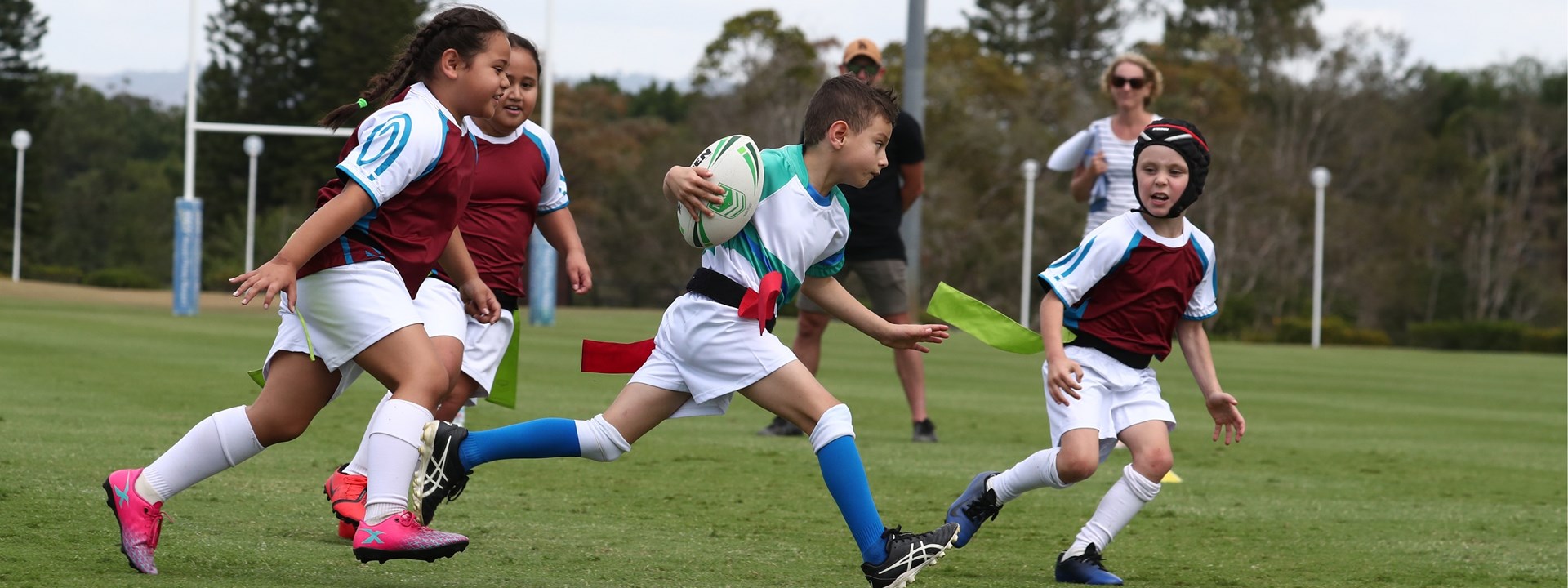
Rugby League Tag
Player Development Framework
Tag Rugby League – Laying the Foundations
Rugby League Tag – Laying the Foundations
The focus of Rugby League Tag will be on fun and learning the basic fundamentals of catch, pass, and run (hopefully in the right direction!). In the process of progressing into tackle Rugby League, children take part in the TackleReady program, a 6-session program designed to teach kids how to tackle and be tackled safely and effectively.
Why start with Tag?
Different kids develop at different stages. By giving kids time to learn the basics before progressing to tackle, we give them more of a chance to enjoy their experience and grow in confidence. All successful junior sports have modified rules for entry-level children. Why? Because we know ‘fun’ is the most important factor in getting kids to come back to sport season after season. Will this effect kids long term capabilities? No, New Zealand Rugby has had Ripper Rugby (tag) for U6s and U7s for more than 15 years and the All Blacks are one of the most successful sporting teams in the world.
Tackling perceptions...
Tag Research
Rugby League Tag Research
Read through the research and trials that have led to the development of the Rugby League Tag initiative.
73%
Reported that Rugby League Tag had improved their child’s confidence in Rugby League.
78%
Reported that their child’s enjoyment of Rugby League Tag met expectations (23%), occasionally exceeded expectations (17%) or exceeded expectations (38%).
56%
Reported that Rugby League Tag had provided increased involvement opportunities in games for their child.
Supporting Research
When exploring the idea of introducing an entry-level format for children to better ready themselves for the game of Rugby League, the NRLs Retention Survey (Usher, 2017) which highlighted ‘injury/fear of injury’ as a key driver for participants not to register in the following season, was evidence that addressing the physical and technical elements associated with tackling and being tackled needed to be considered.
Tag Rugby League allows every new participant the opportunity to better learn
the basic game concepts and skills such as catching, passing, running and evasion.
Starting too early from the standpoint of skill acquisition can lead to a slower rate of learning, which can lead to frustration and the development of bad habits, which can take considerably longer to overcome later in the developmental stage (Anderson & Mayo, 2017).
Jean Piaget’s theory of cognitive development suggests that children move through four different stages of mental development. His theory focuses not only on understanding how children acquire knowledge, but also on understanding the nature of intelligence. The stage of development most relative to this concept is the preoperative stage:
Preoperative stage – ages 2 to 7:
Piaget noted that children in this stage do not yet understand concrete logic, cannot mentally manipulate information, and are unable to take the point of view of other people, which he termed ‘egocentrism’. They are also developing the ability to concentrate on more than one thing at a time.
In a Rugby League context, this information is critical, as it helps us to understand the way in which young participants process new information. It is clear from Piaget’s findings that prior to the age of 7, children are generally unable to process complex tasks due to their incapacity to think logically. Therefore, teaching safe and correct tackle technique to children under the age of 7 may not be the optimal learning window for these younger age groups.
Return to Framework
Find out more about the Player Development Framework (PDF).

